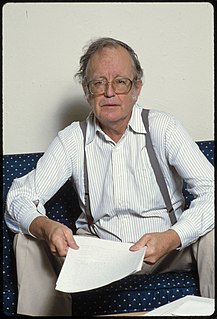A Quote by Jean de la Bruyere
The most accomplished literary work would be reduced to nothing by carping criticism, if the author would listen to all critics and allow every one to erase the passage which pleases him the least.
Related Quotes
It is a fallacy to think that carping is the strongest form of criticism: the important work begins after the artist's mistakes have been pointed out, and the reviewer can't put it off indefinitely with sneers, although some neophytes might be tempted to try: "When in doubt, stick out your tongue" is a safe rule that never cost one any readers. But there's nothing strong about it, and it has nothing to do with the real business of criticism, which is to do justice to the best work of one's time, so that nothing gets lost.
First one gets works of art, then criticism of them, then criticism of the criticism, and, finally, a book on The Literary Situation , a book which tells you all about writers, critics, publishing, paperbacked books, the tendencies of the (literary) time, what sells and how much, what writers wear and drink and want, what their wives wear and drink and want, and so on.
If the mystical lovers of the arts, who consider all criticism dissection and all dissection destruction of enjoyment, thought logically, an exclamation like "Goodness alive!" would be the best criticism of the most deserving work of art. There are critiques which say nothing but that, only they do so more extensively.
What was needed was a literary theory which, while preserving the formalist bent of New Criticism, its dogged attention to literature as aesthetic object rather than social practice, would make something a good deal more systematic and 'scientific' out of all this. The answer arrived in 1957, in the shape of the Canadian Northrop Fryes mighty 'totalization' of all literary genres, Anatomy of Criticism .
A man follows the path laid out for him. He does his duty to God and his King. He does what he must do, not what pleases him. God's truth, boy, what kind of world would this be if every man did what pleased him alone? Who would plough the fields and reap the harvest, if every man had the right to say, 'I don't want to do that.' In this world there is a place for every man, but every man must know his place.
If you work for a man, in heavens name work for him! If he pays you wages that supply you your bread and butter, work for him speak well of him, think well of him, stand by him and stand by the institution he represents. I think if I worked for a man I would work for him. I would not work for him a part of the time, and the rest of the time work against him. I would give an undivided service or none. If put to the pinch, an ounce of loyalty is worth a pound of cleverness.
Most literary critics agree that fiction cannot be reduced to mere falsehood. Well-crafted protagonists come to life, pornography causes orgasms, and the pretense that life is what we want it to be may conceivably bring about the desired condition. Hence religious parables, socialist realism, Nazi propaganda. And if this story likewise crawls with reactionary supernaturalism, that might be because its author longs to see letters scuttling across ceilings, cautiously beginning to reify themselves into angels. For if they could only do that, then why not us?
The question that comes up a lot is, if you had the chance to erase your memory of something specific, what would you erase? And my answer has always been, I wouldn't erase anything, personally. In some ways, I almost wouldn't want to erase anything from the public consciousness, either, for the same reason.









































